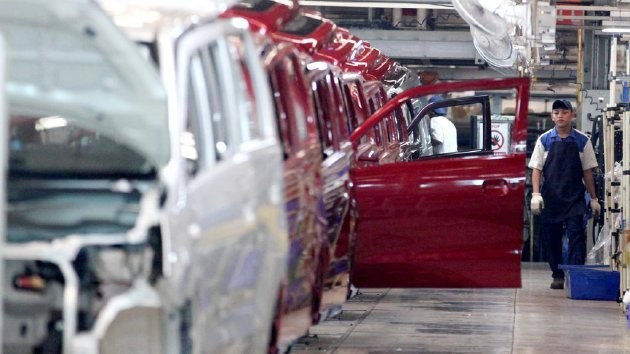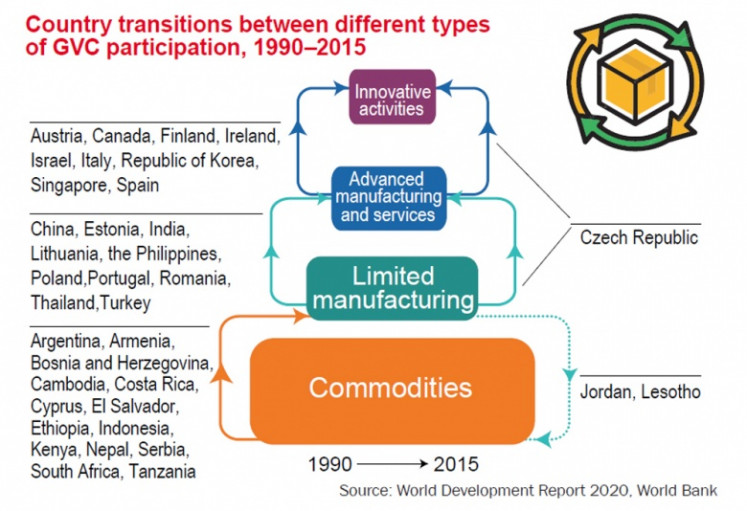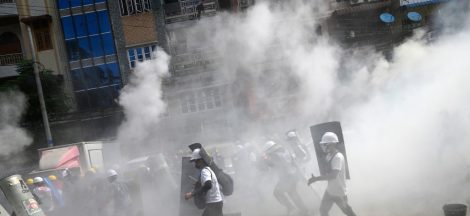Reforms may jeopardize Indonesia’s role in global value chains. Planned economic reforms through omnibus bills on job creation and taxation, while seen as boosting investment, may risk Indonesia’s efforts to increase its role in global value chains and international trade, the World Bank says.

According to the Bank’s World Development Report 2020, some countries weaken social and environmental safeguards to attract foreign direct investment (FDI) but thereby reduce their role in global value chains (GVCs). Common measures include reducing minimum wages, eliminating environmental protections and cutting corporate taxes.
Jeopardize Indonesia
For Indonesia, reforms should address key impediments to participation in global value chains, including competitive labor resources and logistic bottlenecks, said World Bank East Asia Pacific chief economist Aaditya Mattoo.
“Minimum wages can prevent inequality, and the best way to attract FDI and GVCs is to increase productivity,” said Mattoo in Jakarta on Tuesday. Wages in Indonesia were half the level of China’s, but actual labor costs were as high because of low productivity.
“Indonesia’s education system is not equipping its people with adequate skills,” Mattoo told The Jakarta Post. “Investors cannot overcome the scarcity of domestic skills by drawing on foreign skills, because work permits limit skilled foreign workers to only 73 per 100,000, compared to Malaysia’s 858.”
Mattoo said that environmental standards were also needed to prevent a rise in carbon dioxide emissions from transportation and increased waste. Making matters worse, reduced corporate tax rates would make it harder for the government to collect funds needed to build infrastructure.
Jeopardize Indonesia
“Indonesia needs better environmental policies, because, if the country has bad policies, tourism will be discouraged and other countries may not buy the country’s products related to GVCs,” he added.
The government is currently preparing several omnibus bills, including one on job creation and another on taxation, in a bid to attract investors to Indonesia, create jobs and improve economic growth in Southeast Asia’s largest economy.
If passed, the omnibus law on employment will amend around 1,200 articles in more than 80 prevailing laws, including the Labor Law, which have been blamed for hampering investment.
Jeopardize Indonesia
The government has been tight-lipped about details of the bills and expert opinions, but high-rank officials have hinted at relaxing requirements for the Environmental Impact Analysis (Amdal) and building permits (IMB) for low-risk and middle-risk investments.
The omnibus bill on employment will also introduce a minimum hourly wage, a new formula for severance payments and relaxed rules for work permits for foreigners and outsourced workers. The omnibus bill on taxation will reduce corporate tax and tax fines, eliminate dividend tax currently chargeable from overseas business operations and relax expatriate income tax.
Jeopardize Indonesia
President Joko “Jokowi” Widodo has demanded that the House conclude its deliberations on the bills within 100 working days after the lawmakers receive the drafts from the government.
The Office of the Coordinating Economic Minister has on several occasions refuted claims that the omnibus bill on job creation would lower minimum wages or eliminate environmental protections, saying the bill was only meant to ease burdensome regulations.
According to World Bank’s report, involvement in global value chains, which rely on a country’s ability to import raw materials and export products of higher value, can boost economic growth, create better jobs and reduce poverty. However, Indonesia’s role in global value chains has contrasting facets.
“As an exporter of commodities like palm oil and coal, which feed into other countries’ exports of cosmetics and lubricants, Indonesia’s participation is growing, but as an importer of cloth and steel for its own exports of clothes and cars, its participation is diminishing,” Mattoo said.
“Participation in commodities has delivered growth and poverty reduction, especially in periods of high commodity prices, but the shrinking participation in manufacturing reflects the inability to sustain its earlier success.”

Indonesia’s inability to take advantage of global value chains was partly the result of high transportation costs due to distortionary port pricing and burdensome regulations, said Mattoo.
World Bank
“Indonesia charges high prices for international trade, with port services in Indonesia being five times as expensive as in Singapore,” Mattoo said.
The country’s “excessive” port protection has hurt businesses and make it harder for them to import products, he added, citing national standard (SNI) compliance, preshipment inspection and import approval as examples.
Trade Ministry Export Development Director General Dody Edward told the Post that the government was still looking to address burdensome regulations and port pricing, which hampered trade activities.
“We will first need to have a discussion and [reach an] agreement with the Finance Ministry about this,” said Dody. Many businesses were struggling to enter the international market, hence the ministry rolled out coaching programs to boost their competitiveness, he added.
World Bank
Separately, Coordinating Economic Minister Airlangga Hartarto said the government would explore more trade agreements to transform the country from an exporter of raw materials to an exporter of goods with added value. That way, he added, Indonesia would boost its role in global value chains.
The government had also devised policies to boost human resources, Airlangga said, citing the super deduction tax for vocational education as well as early-career training programs. Reforms may jeopardize Indonesia’s role in global value chains: World Bank (Adrian Wail Akhlas, The Jakarta Post) Booming Indonesian Business





 Indonesia Set to Ban Live Animal Imports from China as Coronavirus Fears Grow
Indonesia Set to Ban Live Animal Imports from China as Coronavirus Fears Grow 